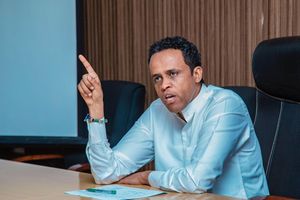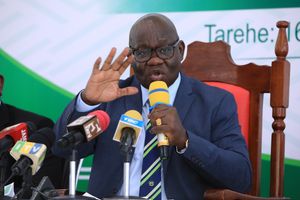Tanzania forms committee to tackle challenges in carbon trading

What you need to know:
- The committee is tasked with evaluating and recommending the most effective approaches to carbon trading
Dodoma. The National Advisory Committee on Carbon Trading in Tanzania has been given a one-month deadline to identify the opportunities and challenges within the sector and offer recommendations for its growth and prosperity.
The committee is tasked with evaluating and recommending the most effective approaches to carbon trading, a sector that is currently operating inconsistently, with limited financial benefits realised by the government.
This was revealed on Thursday, April 10, 2025, in Dodoma by the Minister of State in the Vice President’s Office responsible for Union Affairs and Environment, Mr Hamad Masauni, during the launch of the 20-member committee.
Committee members include representatives from various government ministries, public institutions, civil society, and the private sector.
Mr Masauni explained that the committee’s duties include identifying and analysing challenges within the entire carbon trading system, from registration and measurement to sales and agreements, to improve transparency, efficiency, and accountability while examining regulatory issues.
“We expect the committee to advise on carbon trading, particularly on how to gather accurate information that will allow the country to benefit more from the revenues generated,” he said.
“It should also explore how key economic sectors, including major projects like the Julius Nyerere Hydropower Project (JNHPP), the Bus Rapid Transit (BRT) system, and the Standard Gauge Railway (SGR), can benefit from carbon trading,” said Mr Masauni.
He urged the committee to assess the current management of carbon trading and the monitoring and evaluation systems in place, stressing the importance of a robust framework to track and evaluate carbon projects to ensure they deliver the intended environmental, societal, and economic benefits.
“We rely on your contribution to ensure that Tanzania maximises its benefits from carbon trading, and we execute our responsibilities efficiently for the environment and national economy. Please work together to enhance the efficiency of these efforts and ensure we achieve positive outcomes,” added Mr Masauni.
He emphasised experts' reports on the current state of carbon trading management and recommend best practices and trends within a month.
Mr Masauni encouraged the committee to plan effectively, form smaller groups, and assign specific tasks.
Furthermore, he said the government will continue managing climate change and carbon trading issues with methods that serve national and international interests.
He emphasised that the committee’s launch was a crucial step towards effective management and coordination of carbon trading, urging members to work together to ensure the sector delivers substantial benefits to the nation.
According to him, climate change is a global challenge that demands collective action, suggesting that Tanzania must capitalise on the opportunities presented by carbon trading, which plays a crucial role in reducing greenhouse gas emissions and promoting environmental conservation.
The Deputy Minister of State in the Vice President’s Office for Union Affairs and Environment, Khamis Hamza Khamis, stated that the committee is also responsible for educating the public about the opportunities within carbon trading to encourage broader participation in the sector.
He noted that carbon trading could greatly enhance national income, as demonstrated by other countries already reaping its benefits, with the revenue generated being used to support social services.
The Vice President’s Office for Union Affairs and Environment Permanent Secretary, Mr Cyprian Luhemeja, said the committee’s formation was a step towards unlocking the potential of carbon trading, a key opportunity arising from climate change.





